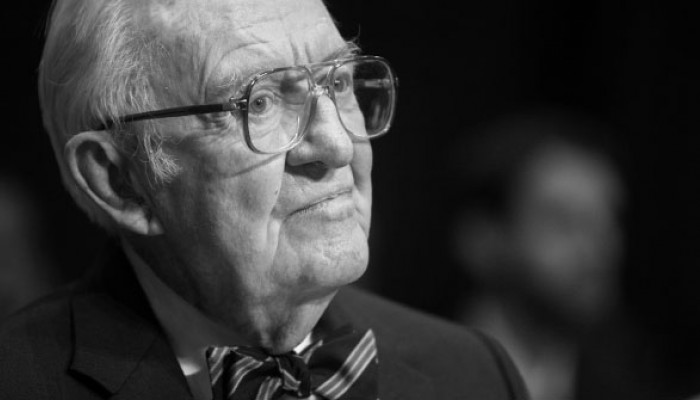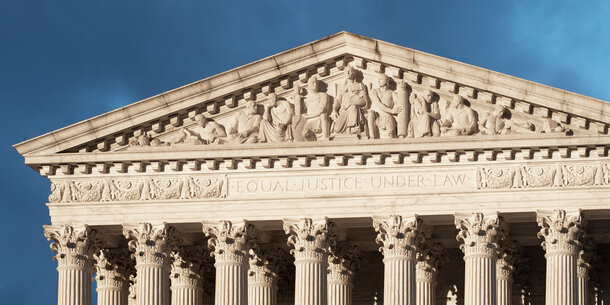By all accounts, U.S. Supreme Court Justice John Paul Stevens, who retired in 2010, lived the last nine years of his life richly and with the same modest nobility with which he served the nation for nearly 70 years. He granted interviews. Many of them. He wrote. He golfed. He laughed at himself. He visited his friends on and off the Court. And he wasn’t shy about expressing remorse and regret — for the mistakes he made writing or signing onto dubious opinions in particular cases, and for the mistakes the Court itself made, as a whole, during his 35-year run.
It may not mean a great deal today that Stevens, in an op-ed last year, called for a repeal of the Second Amendment, or that he called out the Court’s conservatives, his fellow Republican nominees, for recognizing an individual right to bear arms in District of Columbia v. Heller, the epic gun rights decision of 2008. So long as the Roberts Court is dominated by ideological conservatives, the Second Amendment will be broadly read. But Stevens’ criticism of Heller may mean something profound, even precedent-changing, years from now if the makeup of the Court ever again turns progressive and becomes open to a more rational interpretation of the text of the Second Amendment.
Stevens didn’t just write an epic dissent in the case, skewering Justice Antonin Scalia’s dubious opinion. Just a few months ago, Stevens called the Heller decision, in which the Court for the first time recognized an individual right to bear arms within the thorny language of the Second Amendment, the “worst decision” of his tenure on the Court. He was not alone in that pointed assessment. Justice Warren Burger, certainly no liberal, once called the notion of an individual right to bear arms “a fraud on the American public,” a point that Brennan Center President Michael Waldman and others also have well made since Heller was decided.
Likewise, Stevens’s public reversal on capital punishment in the United States, the so-called “machinery of death,” also may bear fruit one day on the High Court if the death penalty doesn’t implode on itself in the meantime. When he first got to the Court, appointed by Gerald Ford in what that earnest president came to believe was one of his greatest accomplishments, Stevens voted in 1976 in Gregg v. Georgia to restore capital punishment after the Court had blocked it four years earlier in Furman v. Georgia.
A quarter of a century later, however, by the time of his retirement, Stevens had come to see what so many justices of his era came to see: that capital punishment as practiced in its modern era still was an arbitrary and capricious exercise laden with racial disparities. Here, too, he was not alone. Two of the other Republican nominees to the Court who initially supported the restoration of the death penalty, Harry Blackmun and Lewis Powell, also came around later in life to realizing that it constituted instead “cruel and unusual punishment” under the Eighth Amendment.
This probably explains why Stevens was willing, in 2002, to side with the Court’s liberals in Atkins v. Virginia in prohibiting capital punishment for those with intellectual disabilities and why he concurred with Justice Anthony Kennedy’s majority decision, in Roper v. Simmons in 2004, to prohibit the execution of those who committed their capital crimes as juveniles. I believe that Stevens knew that he did not have the five votes necessary to outlaw capital punishment outright, so he spent the last third of his tenure whittling away at it.
Stevens also, in the end, regretted the Court’s leading role in gutting the preclearance provision of the Voting Rights Act in its 2013 decision in Shelby County v. Holder, a decision that came three years after he had retired. He was a fierce critic of the Court’s conservative majority in Shelby County, one of the most lamentable decisions in the history of the Court, and took umbrage at the fact that conservative commentators cited his majority opinion in Crawford v. Marion County, a 2008 decision that granted states the right to require heightened voter identification, as some sort of proof that Stevens believed that in-person voter fraud was more of a problem than it is.
Years ago, I asked Stevens why he had been so willing to accept the unfounded assertions of the threat of voter fraud made by government lawyers in Crawford, a case that regrettably (and predictably) has fueled the modern iteration of voter suppression laws by Republican officials around the country. He was defensive with me and pushed back against my assertions that his support for that law was a mistake. Years later, however, he publicly doubted the wisdom of his vote. He was not alone in this assessment, either. Over at Slate, meanwhile, Rick Hasen argues that Stevens made the best of a bad situation in Crawford. Maybe so.
Stevens wrote thousands of opinions and concurrences and dissents in more than a third of a century on the Court. If he were to have polished and defended them all in his later years, his fellow Americans might see him far less charitably than they do today. And if there were more federal judges like him around the country now, willing to stand up to the executive when necessary, willing to defer when appropriate, the rule of law would be better protected than it is today. His death is the end of an era, on the Court, in the United States, and perhaps even in constitutional history.
If the Supreme Court one day reverses itself on Heller, the speeches and writings of John Paul Stevens surely will be marshaled during the briefing. Likewise, if the Court declares capital punishment unconstitutional, it will point to the wisdom that Stevens, Powell, and Blackmun gleaned from witnessing, for decades, the wrongful convictions and biased juries and other injustices that came after Gregg. And if the Court ever again decides to confront voter suppression, Justice Stevens’ post-Shelby County comments will play a role.
John Paul Stevens was a modest, selfless man, the sort of moderate Republican and pragmatic, conservative jurist that has become increasingly rare in public life. In the end, to his everlasting credit, his ability to recognize his errors and seek to rectify them became one of his many strengths.
(Image: Allison Shelley/Getty)


